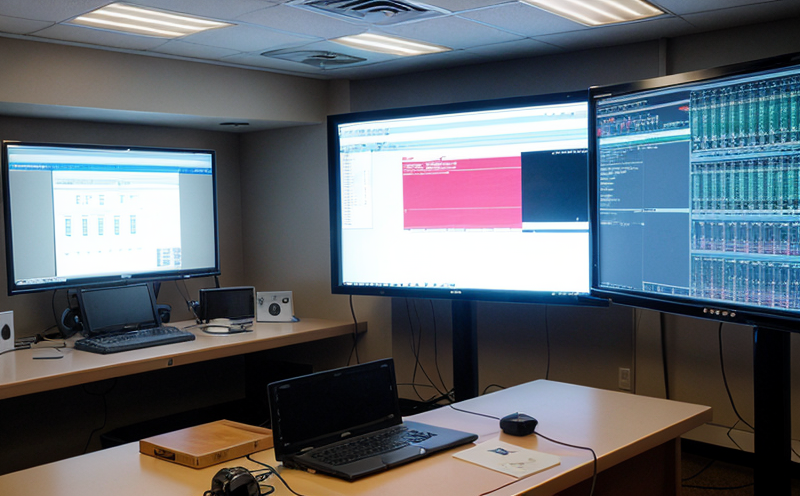EN 50126 Reliability Testing of Automatic Train Protection (ATP)
The EN 50126 standard is pivotal in railway and transportation testing, particularly when assessing the reliability of safety-critical systems such as Automatic Train Protection (ATP). ATP systems are designed to prevent train collisions by monitoring train speed, position, and other parameters. Ensuring these systems function reliably under all conditions is crucial for maintaining public safety.
Reliability testing in accordance with EN 50126 involves a series of experiments aimed at determining the probability of failure within specified operating conditions over time. This testing ensures that ATP systems can withstand environmental stresses, operational demands, and potential faults without compromising safety or performance. The test process is comprehensive, encompassing both laboratory simulations and real-world scenarios to cover all possible use cases.
The standard specifies various aspects including the definition of reliability, the determination of failure modes, and the methods for assessing system availability, maintainability, and safety. By adhering to EN 50126, railway operators and manufacturers can guarantee that ATP systems meet stringent safety requirements as outlined by international standards.
The testing process begins with a thorough understanding of the ATP system's design and operational parameters. This includes identifying all critical components and their interactions within the overall system. Once this information is established, it is possible to simulate various failure scenarios that might occur in real-world conditions. The tests are designed to evaluate how these systems respond under stress, ensuring they can continue operating safely even when faced with unexpected situations.
During testing, a wide range of environmental factors must be considered, such as temperature extremes, humidity levels, vibration, and electromagnetic interference (EMI). Each parameter is tested individually and in combination to determine its effect on the system's reliability. Real-world data from operational environments is also incorporated into these simulations to make them more realistic.
The results of EN 50126 compliance testing are critical for several reasons. Firstly, they provide assurance that ATP systems will function reliably under all expected conditions. Secondly, they help identify potential weaknesses in the design or manufacturing process that could lead to failures if not addressed. Finally, successful completion of these tests can significantly enhance a company's reputation and trustworthiness within the industry.
It is essential for quality managers, compliance officers, R&D engineers, and procurement teams to understand the importance of this testing. They play crucial roles in ensuring that ATP systems meet all relevant standards and specifications. Their involvement ensures that every aspect of the testing process is conducted accurately and comprehensively.
Applied Standards
The EN 50126 standard is widely recognized for its comprehensive approach to reliability assessment in railway safety-critical systems. It has been adopted by various organizations worldwide, including the European Railway Agency (ERA) and many national rail authorities.
- EN 50126-1: General Principles of Reliability Engineering
- EN 50126-3: Methods for Determining Failure Modes, Effects and Criticality Analysis (FMECA)
- EN 50126-4: Application to Safety-Critical Systems
The application of these standards ensures that ATP systems undergo rigorous evaluation across multiple dimensions. From initial design through to operational deployment, each stage is scrutinized to ensure compliance with best practices and international guidelines.
Eurolab Advantages
At Eurolab, we pride ourselves on offering state-of-the-art facilities and expertise in railway testing. Our laboratories are equipped with the latest instrumentation and software tools necessary for EN 50126 compliance testing. This allows us to provide accurate and reliable results that meet all specified criteria.
- Expertise: Our team consists of highly qualified professionals with extensive experience in railway safety-critical systems.
- Technology: We utilize advanced simulation software and hardware to replicate real-world conditions accurately.
- Compliance: All our tests are conducted according to the latest versions of EN 50126 standards, ensuring that you receive up-to-date results.
- Support: Our clients benefit from detailed reports and recommendations for improvement based on test findings.
We understand the importance of reliability in railway safety-critical systems. That's why we offer a full range of services tailored to your specific needs, ensuring that you achieve compliance with minimal disruption to your operations.
Why Choose This Test
- Comprehensive Coverage: Our EN 50126 reliability testing ensures comprehensive coverage of ATP systems across all critical parameters.
- Rigorous Evaluation: We employ rigorous evaluation methods to identify potential weaknesses and areas for improvement.
- Real-World Simulations: Using advanced simulation tools, we replicate real-world conditions to ensure accurate results.
- Up-to-Date Standards: All our tests are conducted according to the latest versions of EN 50126 standards.
- Detailed Reporting: Clients receive comprehensive reports outlining test outcomes and recommendations for improvement.
- Expert Support: Our team provides expert support throughout the testing process, ensuring a smooth and efficient experience.
- Regulatory Compliance: Ensuring compliance with international standards enhances your company's reputation and trustworthiness.
Selecting EN 50126 reliability testing for ATP systems is essential for maintaining public safety and operational efficiency. By partnering with Eurolab, you can be confident in the quality of our services and the accuracy of our results.





